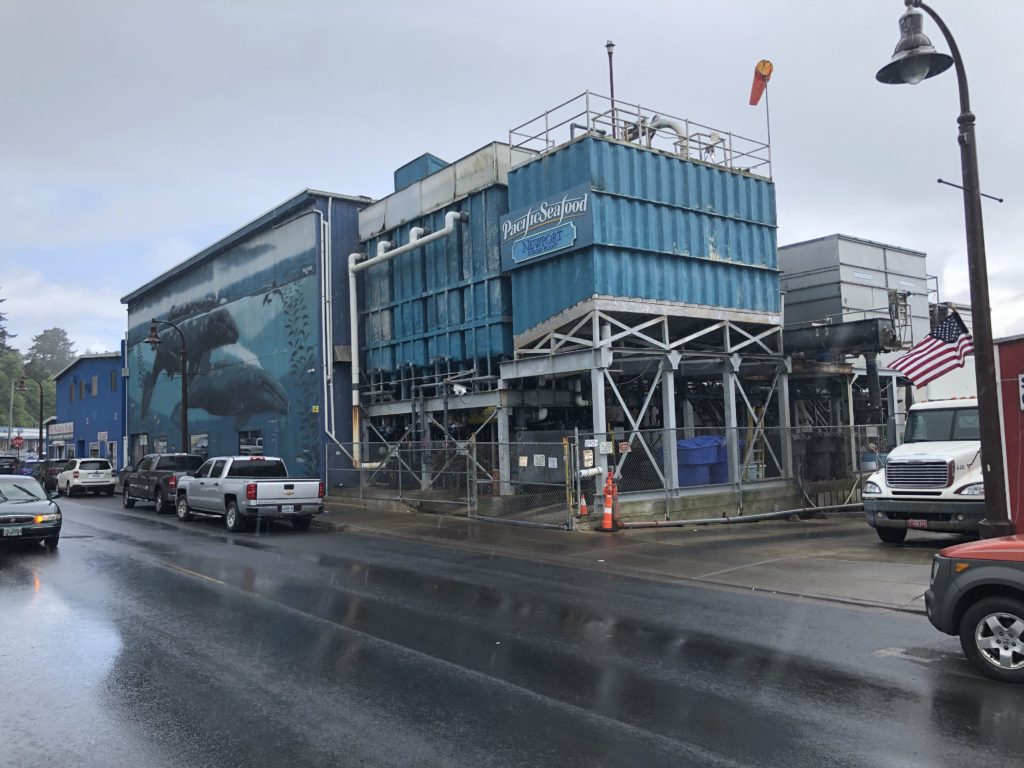
By QUINTON SMITH/YachatsNews.com
Pacific Seafood started reopening two of its five Newport processing plants Wednesday after inspections by state food safety and health officials.
The plants have been closed since Friday after 127 of the company’s workers tested positive for COVID-19, the largest public workplace outbreak in Oregon since the start of the coronavirus pandemic.
After a required 72-hour closure the company is beginning to reopen its plants in stages, initially using uninfected employees and eventually foreign workers. Workers who tested positive for COVID-19 will have to go wait at least 10 more days before returning.
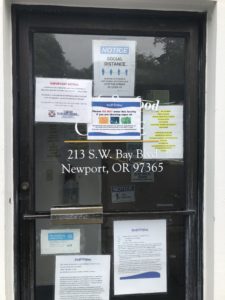
Staff from the Oregon Health Authority, the Oregon Department of Agriculture, Oregon OSHA and Lincoln County Public Health toured the plant Tuesday to see what workplace safety protocols and changes the company had made.
Seafood processors on the Oregon coast are in full swing this time of year. Like many agricultural processors in the Northwest and across the country they are susceptible to COVID-19 outbreaks – but are considered essential businesses by state and federal regulators and not required to shut down only to put approved protocols in place to protect workers.
Pacific Seafood said in a statement Wednesday night that each plant is being evaluated separately as part of a phased re-opening.
“As operations re-open, we will continue to work closely with local and state partners and implement proactive preventative measures consistent with CDC guidance including temperature checks, health screening questions, face masks, face shields, expanded physical distancing, and increased sanitation protocols,” the company said.
Pacific Seafood started reopening its Pacific Bio Products plant Wednesday, where none of the 21 company employees or their contacts tested positive for the coronavirus. That plant is more than a mile east of the company’s four other plants along the Newport bayfront. It takes byproducts from the surimi plant and turns them into additives for pet, fish and animal feed.
Pacific Seafood also started two shifts Wednesday at its surimi processing plant, where 10 of 125 workers tested positive. An additional nine workers had close contact with the positive cases and are also quarantining.
This time of year the company’s surimi plant takes Pacific whiting from a large fleet of Oregon-based trawlers and turns it into imitation crab and other products. The surimi workers are seasonal hires mostly from California and Arizona, arriving in early May.
“All team members returning to work tested negative for COVID-19,” the company said in its statement. “Operations currently remain suspended at all other Newport locations. “
The surimi workers are staying at Newport-area motels, but those who tested positive are in rooms by themselves. The company is paying for motel costs and food deliveries.
Pacific Seafood is also using motels to house 96 workers – 71 from Ukraine and 25 from Mexico – it brought to Newport on the country’s H2B visa program. None of those workers have tested positive for coronavirus and were already quarantining as part of the process of entering the country.
The company told Lincoln County Public Health and other agencies that it plans to reopen its main seafood plant using the foreign workers until more workers become available.
But because the outbreak was so large, there could be issues with finding enough recovered workers and new hires willing to work in fish processing plants that usually operate around the clock.
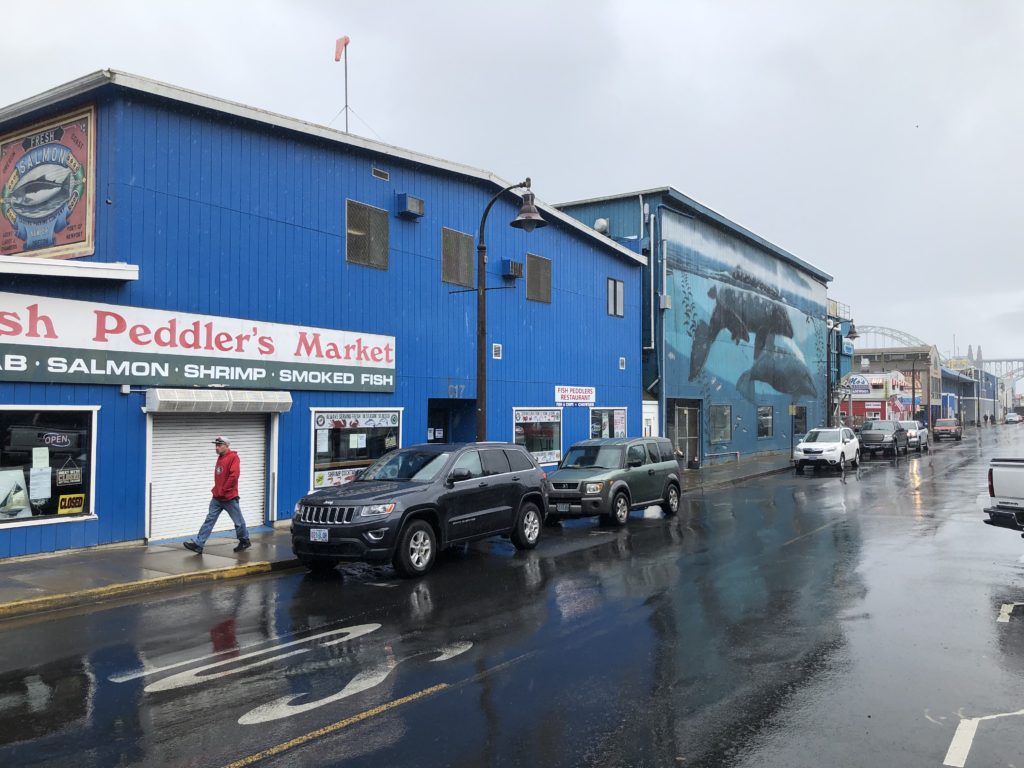
The facilities with the most infected workers were shrimp, fillet and whiting plants that use a mix of employees and temporary, seasonal hires. Some 114 of 229 those workers tested positive, the company told public health officials.
Of workers at those three plants, 109 are Lincoln County residents hired as seasonal workers through Northwest Staffing Services of Portland. Of those 109 temporary hires, 71 tested positive for COVID-19.
The company said it has placed plexiglass barriers between workstations where people can’t be six feet apart, required masks or face shields, marked floors for directions and spacing, is enforcing use of hand sanitizers at checkpoints, and is taking temperature checks when people show up for work.
Health officials said the measures and protocols are fine – as long as the company enforces them. But a worker observed loading a truck at the surimi plant Wednesday, for example, was not wearing a mask.
Outbreak reverberates through community
The workplace outbreak – there were 163 cases total on Wednesday — has rocked county officials and the public. The county also announced Wednesday it was monitoring worker tests at six other businesses.
At least a half dozen restaurants – several on the bayfront – announced closures of several days or weeks. The Waldport Moose Lodge suspended its popular meal program because of the outbreak.
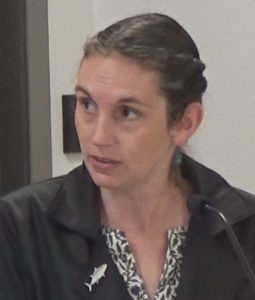
“Until this point the pandemic has been distant,” Lincoln County Commission Chair Kaety Jacobson said at a news conference this week. “That is no longer the case.”
The county had relatively few COVID-19 cases until two weeks ago, then bumped up to 31 following the Memorial Day weekend. And there were no local hospitalizations.
Now the number of cases has reached 163, including a severe hospitalization of a Pacific Seafood worker who went to the emergency room Sunday night and Monday was rushed to Corvallis. There was a second hospital admission Monday, a case not associated with the outbreak.
“This is a massive amount of cases for us,” Nicole Fields, deputy director of the county health department, told county commissioners this week.
The county’s biggest task will be tracking down family, friends, causal acquaintances and anyone else who has had contact with the newly diagnosed cases and getting them to quarantine for two weeks.
Pacific Seafood, which paid for a private laboratory to test its 376 workers, gave the county a list of the infected workers Monday afternoon. The company said had already told workers with positive tests to stay home and that they wouldn’t be allowed to return to work until they get a negative test.

Austen told reporters Monday that the 34 percent positive rate “is extremely high.”
“It’s going to take us quite awhile … a few days … to get through all these people,” Austen said. “They have housing here; they have families here. We don’t know who the close contacts are yet.”
The county now has 67 people helping track down contacts from all the positive cases, 46 tracers from three other counties, the Siletz tribe, the state of Oregon, Oregon State University Extension and nursing students from Oregon Coast Community College.
Anyone who has been within six feet of a COVID-19 positive person for 15 minutes or longer will be asked to quarantine for 14 days, the county said. They won’t be tested for the coronavirus unless they develop symptoms or get a referral from a doctor.
The county has trained additional staff to help with tracing and is getting help from the state and other counties.
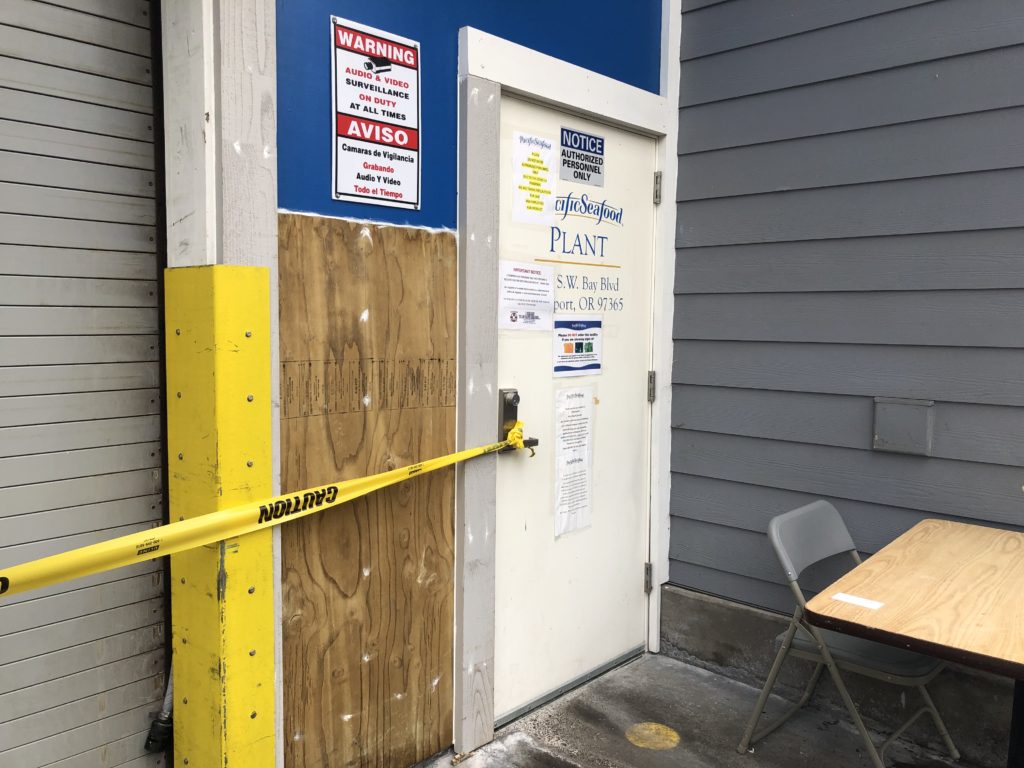
Agencies won’t say what they saw Tuesday
The company had already announced last week it was making changes throughout the plants to protect workers, including extensive cleanings, requiring face masks or face shields, daily temperature checks, installing work station barriers, and staggering work shifts.
Two food safety officials from the Oregon Department of Agriculture, three from the Oregon Health Authority and one from Oregon-OSHA visited Pacific Seafood’s plants Tuesday.
“The Oregon Department of Agriculture takes the role of protecting the state’s food supply,” agency spokeswoman Andrea Cantu-Schomus said Thursday in an email. “COVID-19 is not a food-borne illness and the seafood products manufactured by Pacific Seafood have not been impacted. The measures the facility is taking such as reduced operational capacity, increased facility sanitation, and methodical hygienic practices will only serve to improve to help secure the food supply.”
Rustin Rock, an ODA food safety specialist, was one of those who visited Tuesday. He had also been at the plant the plant June 2 as the outbreak mushroomed.
“We don’t want any more outbreaks but we do want them to at least have a partial operation,” Rock told reporters before Tuesday’s visit, adding that the plant’s closure could jeopardize some of the area’s seafood harvest.
“You have to protect public health. That’s No. 1,” Rock said. “But you have an essential food processor that needs help too.”
Lincoln County Public Health officials weeks ago had expressed concern about the outbreak among hundreds of workers in the close confines of Newport’s food processing plants.
County officials said they had asked Pacific Seafood managers if they had protocols in place should there be an outbreak.
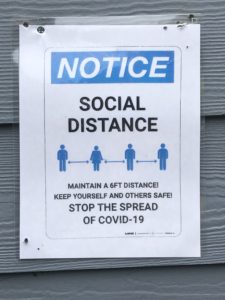
Austen and Jacobson said the county also requested if it could do “active surveillance and testing” to establish a baseline for the presence of coronavirus among workers.
“The plant wasn’t quite ready to go there yet,” Austen said Monday.
Dr. Paul Ciselack of the Oregon Health Authority told reporters that the state was also not willing at that point to test large numbers of people who were not showing symptoms of the coronavirus.
Pacific Seafood and Bornstein Seafood plants in Clatsop County were shut down in May because of outbreaks there. The bulk of that county’s 46 COVID-19 cases can be traced to the plants, the county’s health director said last week, as he called on state agencies to more closely inspect plants and conduct regular testing.
The 127 cases at Pacific Seafood dwarfs Oregon’s last major outbreak at a food processor – 48 cases confirmed at Townsend Farms, a berry processor with plants in Fairview and Cornelius. There was an earlier outbreak involving 34 cases at a food plant in Albany.



Great reporting Quinton – by far the best in the area. Wish we had up to date information that you provide here in Newport! Only found out about your website recently. Keep up the good work!
Until all of these infected workers are all contact traced and all those individuals told to self quarantine they are going to be out and about in the grocery stores and in public possibly spreading the virus. Hope this is happening sooner, as in by now because it’s been almost a week since the first large group of infected individuals were identified. The longer those contacts are not identified nor isolated from the community is the more community spread that will happen. Every single close contact should be tested, but if they are asymptomatic, that may not happen given the testing standards that still don’t address this critical issue. No more grocery shopping in Newport for me, http://www.covidactnow.org describes this area as high risk now because of these issues.